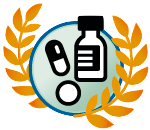 |
• PILULE D'OR ("GOLDEN PILL") :
ERVEBO° Ebola vaccine rVSV-Zebov MSD
For active immunisation of individuals 18 years of age or older to protect against Ebola virus disease caused by Zaire Ebola virus (Prescrire Int n° 223). |
Ebola virus disease is a serious infection. Most outbreaks have occurred in Africa, killing 30% to 90% of infected patients, depending on the outbreak. Death occurs in a context of generalised haemorrhage and multiorgan failure. Prevention is based mainly on strict hygiene and protective measures for anyone likely to have been in contact with infected patients, including healthcare professionals.Treatment is mainly symptomatic.
Ebola vaccine rVSV-Zebov is a live attenuated vaccine based on vesicular stomatitis virus (VSV), engineered (rVSV) to express a protein from Zaire Ebola virus (Zebov).
The evaluation data show that, during an outbreak of Zaire Ebola virus disease, vaccination protects at least two-thirds of persons who have potentially been in contact with infected patients, and that its protective effect starts from day 10 after vaccination. Its harms are acceptable, given the severity of this disease, and include adverse effects common to all vaccines, as well as joint and skin disorders. Ervebo° was awarded the Pilule d’Or on the basis of these data.
A number of risks and unknowns must be taken into account, however. For example, although vesicular stomatitis virus is not generally pathogenic in humans, it has been found in certain body fluids of vaccinees, which raises the possibility that they could transmit this virus to other people. Ebola vaccine rVSV-Zebov is a live vaccine that has not been evaluated in immunocompromised individuals, and the consequences of infection with the vaccine virus in this situation are unknown. In addition, a threefold risk of miscarriage was reported in women who became pregnant during the 2 months after vaccination. Compliance with the vaccine’s storage conditions (between -80°C and -60°C) is challenging and complicates its use in many countries. The duration of the vaccine’s protective effect is unknown. Finally, vaccination does not eliminate the need for strict protective and hygiene measures around patients infected with Ebola virus. |
|
|
Honours List:
- FEXINIDAZOLE WINTHROP° (fexinidazole) Sanofi Aventis
For human African trypanosomiasis (sleeping sickness) due to Trypanosoma brucei gambiense (Prescrire Int n° 221).
Human African trypanosomiasis (or sleeping sickness) is caused by a parasite of the genus Trypanosoma, usually T. brucei gambiense. This disease is endemic in many countries in sub-Saharan Africa. It typically affects people living in rural or periurban areas.
If left untreated, the disease is usually fatal within 2 to 3 years on average from the start of infection with T. brucei gambiense.The disease progresses through two stages: the early haemolymphatic stage, characterised by recurrent fever, joint pain, muscle pain and fatigue, followed by the avanced meningoencephalitic stage, during which the parasites infect the central nervous system, causing neuropsychiatric disorders that almost always progress to coma and death.
Cure rates with pentamidine or nifurtimox + eflornithine combination therapy (NECT), depending on the disease stage, exceed 95%. But these treatments require daily injections or infusions for 7 days, administered in a healthcare facility, which limits access to these treatments in regions with limited health infrastructure, some of which are also affected by armed conflict.
Fexinidazole is an antiparasitic drug for oral use. After 10 days of treatment, its cure rate exceeds 90% at both stages of the disease. Its adverse effects are acceptable when weighed against this level of efficacy: nausea, vomiting, neuropsychiatric disorders, and QT prolongation. Fexinidazole Winthrop° earned a place on the Honours List in the 2020 Prescrire Drug Awards because of fexinidazole’s positive harm-benefit balance and because the availability of an oral treatment for this disease represents a clear practical advance for patients.
However, NECT remains the first-choice treatment for patients with the most advanced forms of the disease and who have access to this treatment, as it is probably slightly more effective in this situation.
- VYNDAQEL° (tafamidis) Pfizer
For adults with transthyretin amyloid cardiomyopathy (Prescrire Int n° 222).
Transthyretin amyloidosis is a rare, fatal disease that generally presents between 30 and 50 years of age. Patients have a life expectancy of about ten years after diagnosis. This disorder is caused by instability of the protein transthyretin and leads to amyloid deposits in a range of organs.The clinical signs vary depending on the organs affected, but include cardiac disorders (heart failure, thrombosis and conduction disturbances).
Tafamidis is a drug that binds to and appears to stabilise transthyretin. In a placebo-controlled trial in 441 patients with symptomatic transthyretin amyloid cardiomyopathy, mortality after 30 months of treatment was lower in the tafamidis group: 30% versus 43% in the placebo group. One limitation of these results is that they remain to be confirmed in at least one other trial, conducted by a different team.
The benefits of tafamidis must be weighed against its harms: infections and gastrointestinal, ocular and probably hepatic disorders. Uncertainty remains over the optimum daily dose. Nevertheless, the magnitude of the effect observed led Prescrire to place Vyndaqel° on the Honours List of the 2020 Prescrire Drug Awards.`
For details, download the complete review: |
